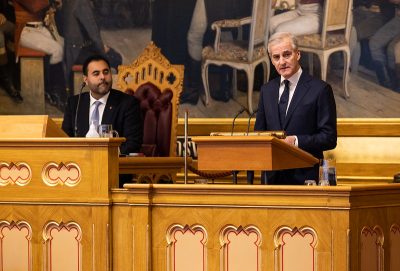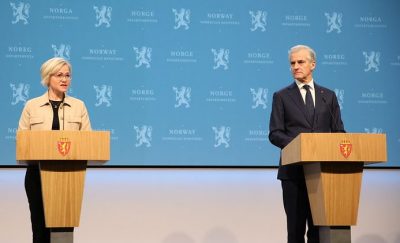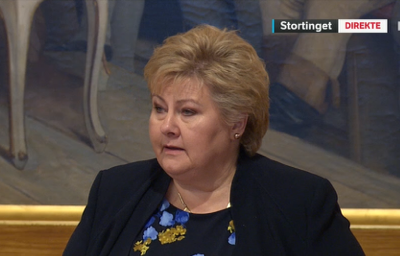Norway’s new government still doesn’t want to reimpose any invasive measures to crack down on new record Covid-19 infection levels in the country. Prime Minister Jonas Gahr Støre is opting instead to rely heavily on vaccines, some new testing, isolation and entry rules, a few national recommendations and efforts to speed up booster shot programs.

“The pandemic is not over, but it’s in a new phase,” Støre said in an address to Parliament Tuesday morning and again at a press conference shortly thereafter.
He also believes Norwegians need to learn to live with virus infection risk, while stressing that the vast majority who have been vaccinated are “much better protected now” than when the pandemic began.
“Covid-19 is here to stay,” he told Parliament, arguing that invasive measures are no longer necessary. On the contrary, he said, he and his government only want to impose “more suitable and effective measures” that can shield those most vulnerable and “hinder a new shutdown.”
They include a new national recommendation (but not a demand) to use face masks when using public transportation or shopping in stores. Støre had difficulty in explaining why face masks were not recommended while standing in lines, for example, to enter or sit in cinemas, concert halls or theaters, in bars or restaurants or while attending sporting events in packed grandstands or other public gatherings. He suggested people need to use their own judgment and simply be aware of their proximity to others.

Nor did either he or Health Minister Ingvild Kjerkol have any advice for those uncertain about whether to plan any large family parties during the upcoming holiday season. Kjerkol, however, has earlier encouraged Norwegians to attend traditional company julebord (Christmas parties), even though the Parliament itself has cancelled its own traditional Christmas luncheon for the second year in a row.
The government has already issued new quarantine, isolation and testing rules for those living with someone who’s been confirmed with Corona infection, whether they’re fully vaccinated or not. All those testing positive, meanwhile, must isolate themselves for five days, also if they’re fully vaccinated, and be fever-free for at least 24 hours before going out. (For more details, see the government’s announcement here, external link in Norwegian only.)
The government also has issued some new border control measures in an effort to “limit and delay the spread of the new virus variant discovered in South Africa.” Anyone arriving from southern African countries must be tested before and upon arrival, undergo hotel quarantine and then to more testing. (For more details, see the government’s announcement here, also an external link in Norwegian only.)
Then came the new national measures on Tuesday that are only recommendations, not regulations that can be punishable if violated. They include the use of face masks, also when in contact with health care services.
“We also extending a recommendation for regular testing of school children in areas where infection has spread and where health care services and hospitals are strained,” Støre said, “and we ask that municipalities with increased infection and strained health care services evaluate use of home offices.”
Leaving rules up to local governments
The state government thus continues to leave most Corona containment measures up to local governments, like in Oslo, where a dubious new record was set on Tuesday with 831 new confirmed cases of the Corona virus. Oslo’s city government leader Raymond Johansen, however, has also refused to impose any strict violations and even urged residents to go out and enjoy parties and public gatherings during the holiday season. “Don’t cancel,” he said on Monday.
That can leave many people confused over what’s the right thing to do as infection levels rise around them. Støre, Kjerkol and Johansen, all from the Labour Party, stress they’re acting on the advice of state health authorities, even though the state health directorate last week cancelled its own large Christmas party for employees.

Støre continued to lean heavily Tuesday on the fact that more than 90 percent of Norway’s population is fully vaccinated, and that all those aged 65 and over will have received offers of a third booster shot by Christmas. He stressed throughout both his address to Parliament and at the press conference afterwards that vaccines “are still the best and most important” to protect people.
Questions remain, however, over whether current vaccines will also guard against the new strain first confirmed in South Africa and now spreading around the world, also to Norway’s neighbouring countries of Sweden and Denmark. Health authorities and government officials themselves admit it’s just a matter of time before it’s confirmed in Norway as well.
Those vaccinated don’t seem to become seriously ill, according to international press reports. Dr Camilla Stoltenberg of the public health institute FHI, however, admitted at Tuesday’s press conference that there’s still “great uncertainty” around the effectiveness of current vaccines against the new strain, many “unanswered questions” and that studies continue.
Støre also called once again on local governments to speed up their booster shot programs, now with a goal of having everyone over age 18 vaccinated for a third time “by the Easter holidays,” which happens to come late next year, in mid-April. Støre is offering full state government financing to “mobilize” booster shot programs, with a plea that local governments work just as quickly and efficiently as they did last winter and spring to vaccinate their residents to a degree viewed as “full” at that time. Now third shots are deemed necessary.
“We must mobilize again,” Støre told Parliament, adding that the state “will cover the bill.” He admitted the new strain of the virus has created more uncertainty, promising to “follow developments closely, hour by hour.” He claimed his government is “prepared to do what’s necessary” to hinder the spread of infection, while thanking all health care personnel who have worked hard to do the same for nearly two years. Støre still doesn’t think it’s “correct” to shut down the country again, because of the high costs that would have, both socially and economically.
Opposition politicians weren’t entirely convinced. The Conservatives’ former prime minister, Erna Solberg, thanked Støre for his presentation to Parliament but claimed she hopes he and his government will be “more on the offensive moving forward.” She also said she expects Støre and his ministers to communicate “more clearly, act more quickly and listen to professional advice,” noting that several of the recommendations he’s imposing now were first issued by health authorities three weeks ago.
Solberg, who last year had to impose the most invasive measures in Norway since World War II, had already criticized Støre’s government as being too passive in addressing the recent spikes in Corona infection. Solberg and several others in opposition also think he and his ministers have been unclear about their Corona strategy, even questioning if they have a strategy at all.

On Tuesday she said she’s glad the government is making efforts to speed up the tempo of third booster shot programs, but wants more information about vaccination strategy and programs for children. She also referred to the uncertainty now swirling around the effectiveness of the vaccines themselves, adding that it’s “disappointing” that they may be less than previously thought.
Progress Party leader Sylvi Listhaug said she was relieved the government was not planning any shutdowns, but wants more concrete measures to boost hospital capacity, educate more intensive care nurses and pay them better. Other party leaders expressed much the same.
Several mayors across party lines and around the country, meanwhile, have also sought clarity in the government’s strategy. They’ve also wanted the government to impose national regulations, instead of just recommendations for anti-infection measures such as face-mask use. Some were expressing disappointment Tuesday afternoon that the government still isn’t “taking charge,” and instead was “sending responsiblity back to local governments.”
Even a mayor from one of the government’s own parties, Center, was disappointed. “I’m glad they’re tightening up some measures,” Seljord Mayor Beate Marie Dahl Eide of the Center Party in Telemark, told state broadcaster NRK, “but the state must make things more predictable for business. I’m worried about the consequences if we don’t get more concrete compensation proposals on the table. People are landing in quarantine now and that can have consequences, too.”
Labour Mayor Terje Wikstrøm of Hammerfest, which has struggled with high infection rates, was also unimpressed. “We’ve already had these recommendations (on a local basis) for the past three- to four weeks,” he told NRK, and that didn’t ward off 418 new confirmed cases of the virus in the past 14 days.
newsinenglish.no/Nina Berglund

